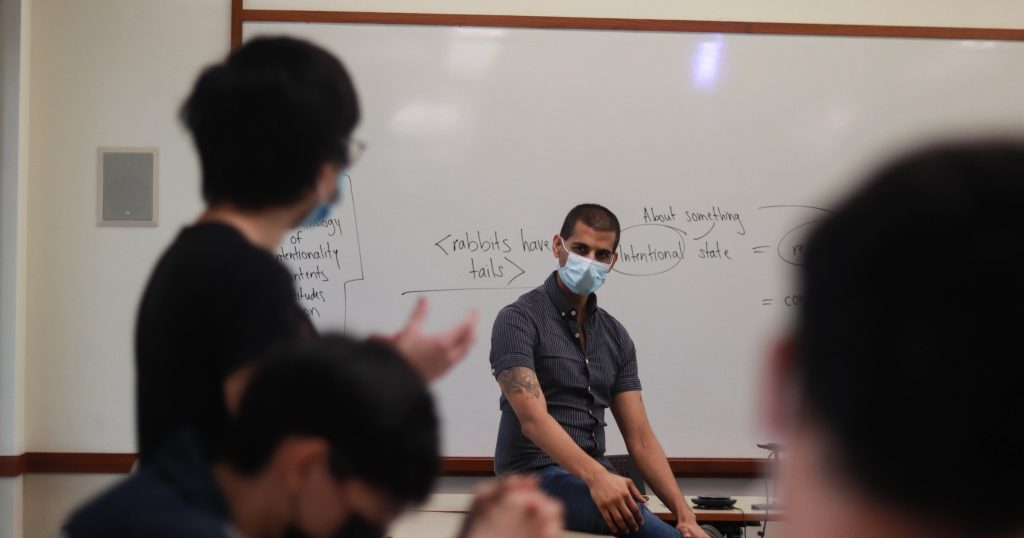Learning philosophy and applying it beyond the classroom
How a Yale-NUS professor encourages students to apply philosophy beyond the classroom
Learning beyond the classroom is a cornerstone of the Yale-NUS curriculum, which exposes students to knowledge and skills beyond the scope of a single course.
In two of the courses that he is teaching this semester, Neil Mehta, Associate Professor of Humanities (Philosophy) and Head of Studies for Philosophy, has integrated learning both within and beyond the classroom to create a unique curriculum of both practical and theoretical knowledge. Titled ‘Consciousness’ and ‘Reality’, Assoc Prof Mehta’s two courses challenge fundamental ideas in philosophy – namely, consciousness and the structure of reality.
 Assoc Prof Mehta in his ‘Consciousness’ class. Image by Rachel Tey.
Assoc Prof Mehta in his ‘Consciousness’ class. Image by Rachel Tey.
Explaining his emphasis on practical and theoretical learning, Assoc Prof Mehta said, “One of the most important things I do throughout each course is emphasise skills that have non-academic applications, such as precision, concision, and sound argumentation.”
For instance, argumentative, writing, and conversational skills are part of the learning objectives for both ‘Consciousness’ and ‘Reality’. In each of his courses, Prof Mehta also encourages intellectual virtues, such as taking initiative and embracing uncertainty.
His courses tackle challenging questions: what is the structure of reality? Or, how can we explain consciousness? Beyond this, his courses also ask unconventional, perhaps perplexing questions: do ordinary objects like chairs and tables exist, or are they a convenient fiction?
Combined with the philosophical course materials, these practical skills have limitless applications.
“Several of my students have told me that they became much better listeners after taking my seminars,” Assoc Prof Mehta said. “When they talked to their friends, they stopped trying to constantly formulate their own responses, and focused on just absorbing what the other person was saying. It was a great delight for me to hear that.”
Another interesting aspect of Assoc Prof Mehta’s teaching is his philosophy on embracing failures. In fact, he has an unconventional habit of labelling them not as failures, but as “beautiful failures”.
For Ryan Yeo (Class of 2024), who is currently enrolled in the ‘Reality’ course, this concept took getting used to but was ultimately rewarding. “Whenever we gave an incorrect answer during seminar, Assoc Prof Mehta called it a “beautiful failure”. I found that jarring and discomforting at first,” he explained. “Over time, though, the practice really helped because I am now desensitised to the word ‘failure,’ which is a step I never thought I could take.”
In the same spirit of self-improvement, Assoc Prof Mehta actively tries to refine his teaching techniques for each new batch of students.
“I never teach my seminars the same way twice,” he said. “I try to notice when a significant number of students make the same kinds of mistakes, and then change my teaching to ensure that students won’t fall into that same trap the next time round. I apply this method to every part of my teaching.”
In the end, the various skills and lessons students can take away from Assoc Prof Mehta’s courses have made it an invaluable learning experience.
“All in all, I think Assoc Prof Mehta’s courses hold us to very high standards. At the same time, this comes with a lot of care, encouragement, and valuable lessons on failure,” Ryan added. “I get a real sense of fulfilment from this course! I am learning so much, both in terms of sharpening my thinking and writing skills, as well as being a better person.”





